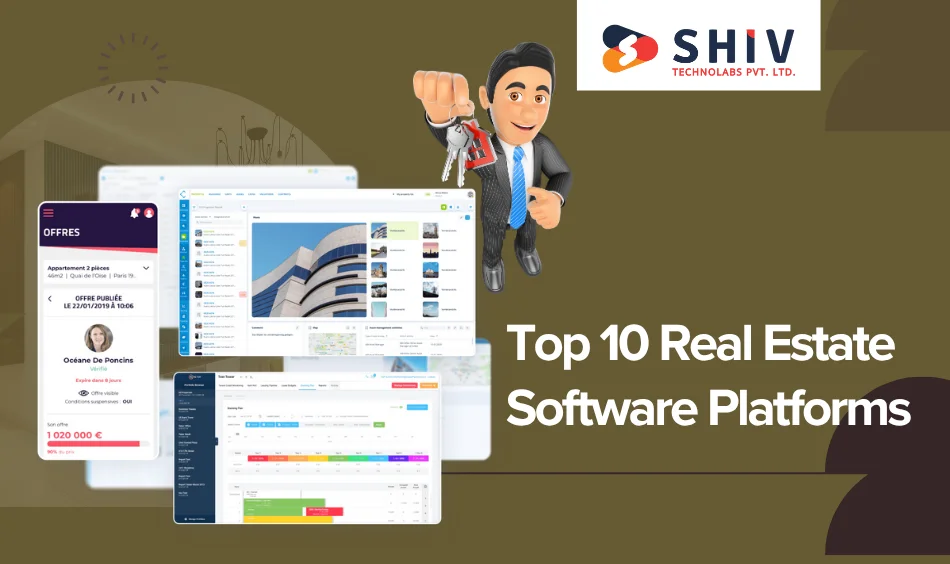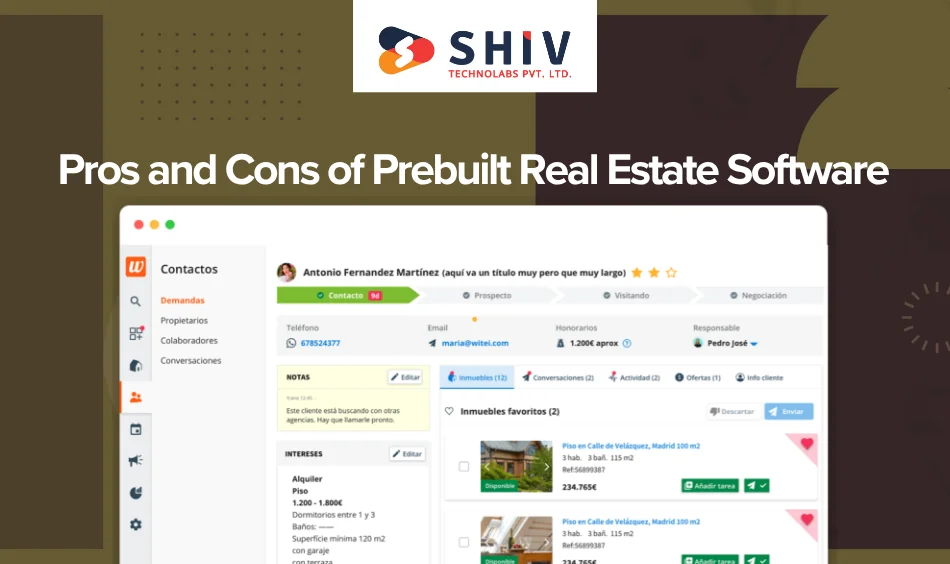Table of Contents
Most real estate teams use software to handle listings, client details, payments, and daily tasks. Building a custom platform sounds good, but it usually costs more and takes longer.
That’s why many firms first review popular tools already working for others. These options can help teams run faster without large upfront costs. But off-the-shelf tools rarely fit every need, and that’s where custom work steps in.
Real estate software development services give businesses two smart paths. They help you pick the right prebuilt platform for now or build a solution that fits your goals from the start.
Why Review Software Platforms Before Building One?
Before writing code, it helps to look at what’s already available. Many U.S.-based platforms were built for common real estate tasks—rent collection, CRM, and listing management.
The best real estate software in the USA can get you started fast. But that speed often comes at the cost of flexibility.
Many teams hit limits once they try to grow or change how they work. Custom settings may not be available. Integrations can break. Some tools charge extra just to add users or unlock features.
Looking at prebuilt software does offer some value:
- It helps you understand which features matter most
- It lets you test what works before you commit
- It avoids building tools that already exist
But for serious teams, these platforms are often just the first step. Once you know what works—and what doesn’t—you’ll be in a better place to build the right software with help from a development partner.
What to Look for in a Property Management Platform
No matter the size of your business, some features are non-negotiable. You want to spend less time on admin and more time closing deals.
If you’re checking out property management software in the USA, companies focus on tools that make your day simpler.
| Key Feature | Why It’s Useful |
|---|---|
| Listings Management | Quickly update and publish across multiple platforms. |
| Lead Tracking | Keep all inquiries, visits, and follow-ups in one place. |
| Digital Payments | Collect rent, deposits, or fees on time. |
| Request Handling | Track service issues from open to resolved. |
| Portals | Give tenants and owners secure access to documents. |
| Reports & Insights | See which properties bring in the most revenue. |
| Mobile Access | Let your team work from anywhere. |
| App Integrations | Connect with tools you already use like QuickBooks. |
Some teams outgrow basic platforms fast. That’s a sign you need software shaped around your process, not the other way around.
Top 10 Real Estate Software Platforms in the USA

Many real estate teams begin with ready-made software. These tools help with listings, rent collection, and client records. But each platform has its own limits. Some are built for small landlords, others for large firms. And few of them offer the freedom or flexibility that a growing business might need.
Let’s go through 10 well-known platforms used in the USA and what each one offers.
1. AppFolio
AppFolio helps real estate managers handle listings, payments, and maintenance work. It offers a mobile app, a tenant portal, and simple tools for leasing and screening. You can also manage service requests without relying on extra software.
2. Buildium
Buildium gives teams features like online rent collection, accounting tools, and lease tracking. It works well for property managers and condo associations. You can track payments, upload documents, and handle maintenance from one dashboard.
3. Propertyware
Propertyware supports companies that manage single-family homes. You can create custom reports, schedule repairs, and handle tenant communication. It also includes tools for accounting, inspections, and managing vendors.
4. TenantCloud
TenantCloud is a better fit for independent landlords. It covers lease templates, rent reminders, and digital payments. The platform lets tenants and landlords send messages, track requests, and keep rental info organized.
5. Yardi Breeze
Yardi Breeze offers simple tools for listing properties, accepting payments, and managing leases. It also includes basic CRM features. This platform works for residential, commercial, and mixed-use property owners.
6. ResMan
ResMan helps mid-sized property managers stay on top of finances, budgets, and compliance records. It works well for teams handling student housing, affordable rentals, or multi-unit apartments. The software also includes vendor tracking and service logs.
7. RealPage
RealPage is often used by larger firms. It includes tools for marketing, leasing, analytics, and energy tracking. It also supports automation and payment processing. RealPage suits teams that need deeper control across many properties.
8. Rentec Direct
Rentec is ideal for small property owners. It supports rent tracking, tenant screening, and repair scheduling. You can also connect your bank accounts and upload lease files. It’s basic but covers most day-to-day needs.
9. MRI Software
MRI Software is known for its flexibility. It supports mixed portfolios and can connect with custom tools. Businesses use it for lease management, detailed reports, and tenant communication. It’s designed for firms with unique processes.
10. Condo Control
Condo Control focuses on HOAs and residential communities. It helps boards manage announcements, parking, security, and payments. Residents get their own portals to view notices, submit requests, and pay fees.
Pros and Cons of Prebuilt Real Estate Software

Off-the-shelf tools help real estate teams get started quickly. They come with standard features like rent tracking, basic CRM, and online payments. But that speed and convenience often come with trade-offs.
Pros
- Easy to set up and use
- No upfront development costs
- Regular updates and tech support
Cons
- Limited control over how features work
- Hard to scale or add new functions
- May not match your team’s daily process
Many companies use these tools early on. But when things grow, those same tools can slow you down.
Also Read: What to Look for in Real Estate CRM Software Before You Choose One
When Should You Consider Real Estate Software Development Services?
If your team is managing more data, juggling too many tools, or using workarounds to get things done, custom software may be a better path.
Here are some signs it’s time to build your own system:
- You need features that prebuilt software don’t offer
- You want better control over reports and workflows
- You’re planning to grow and need software that grows with you
With help from real estate software development, you can build tools that fit your exact process. You won’t need to change how your team works—your software will follow your lead.
You’ll also avoid feature limits, paywalls, and third-party plugins that don’t always work well together.
Conclusion: Make the Right Move for Your Business
Prebuilt tools help many real estate teams get started. But they don’t always support long-term growth or unique business needs. As your operation grows, your software should work around your team, not the other way around.
If your current tools feel limiting, it’s time to consider a better path.
Shiv Technolabs, a trusted custom software development company, can help you build the right solution from the ground up. Whether you manage properties, handle associations, or run real estate operations at scale, we’ll help you create software that fits the way you work.
Reach out today to talk about your goals. We’ll help you build smarter, not harder.






















